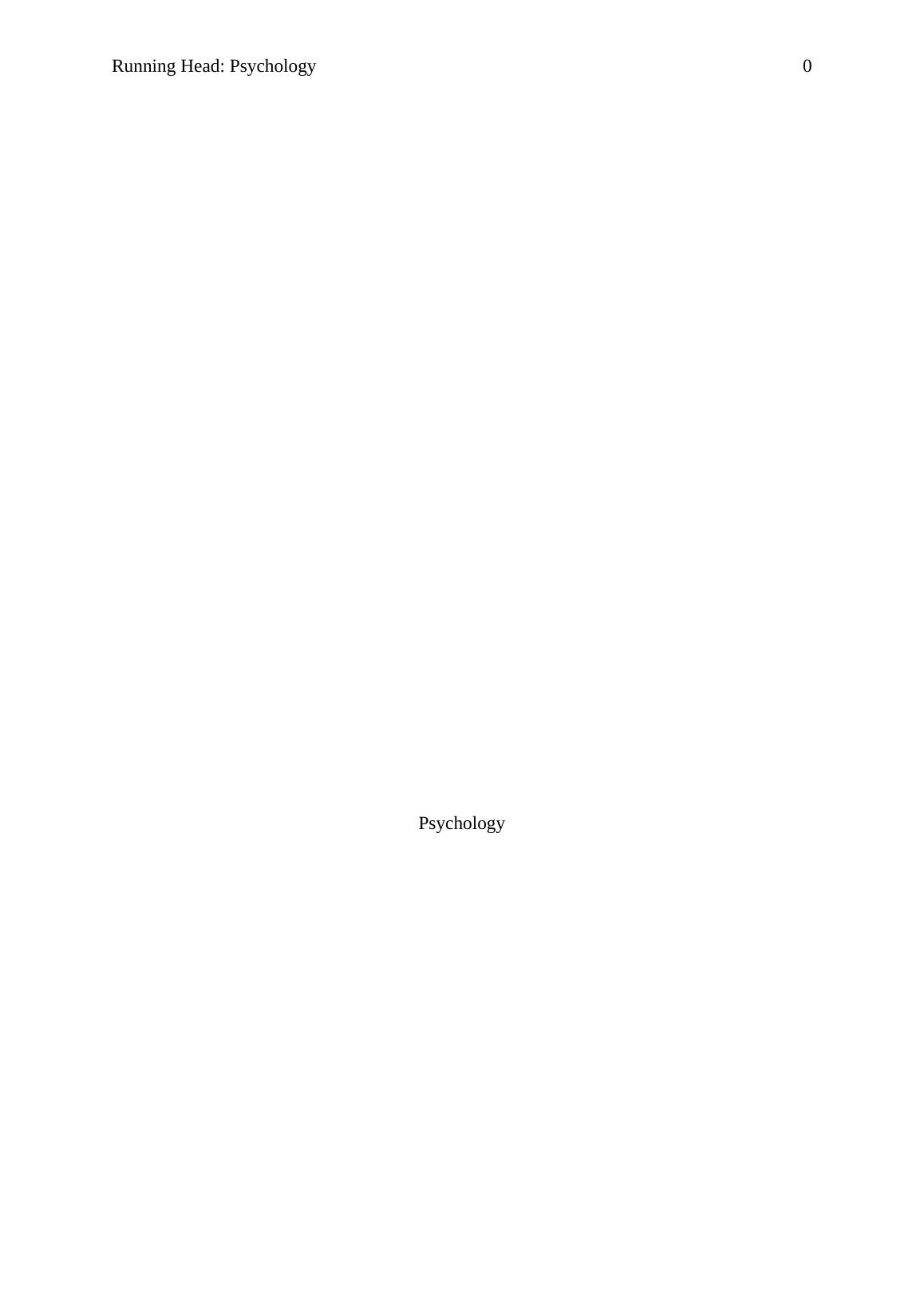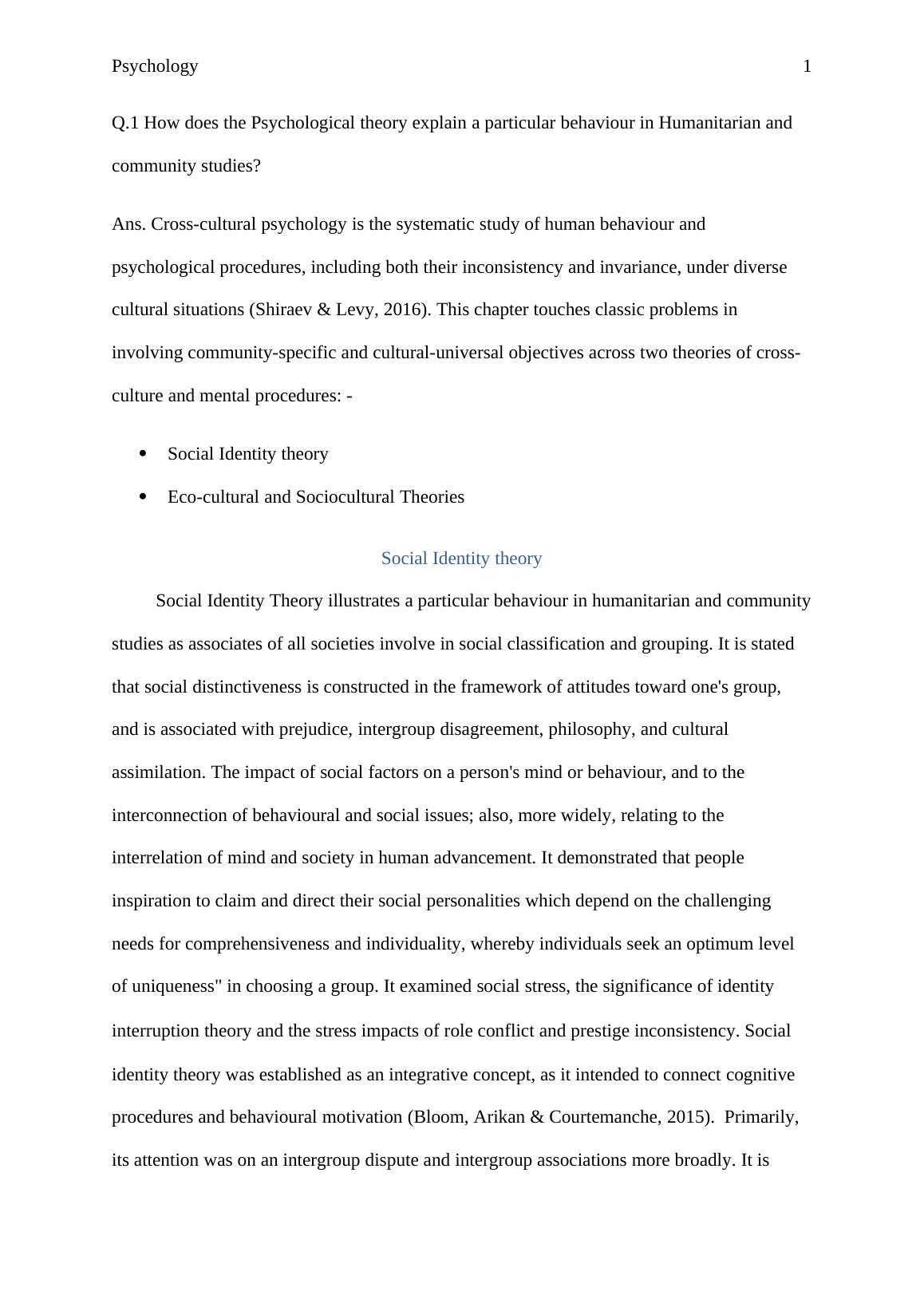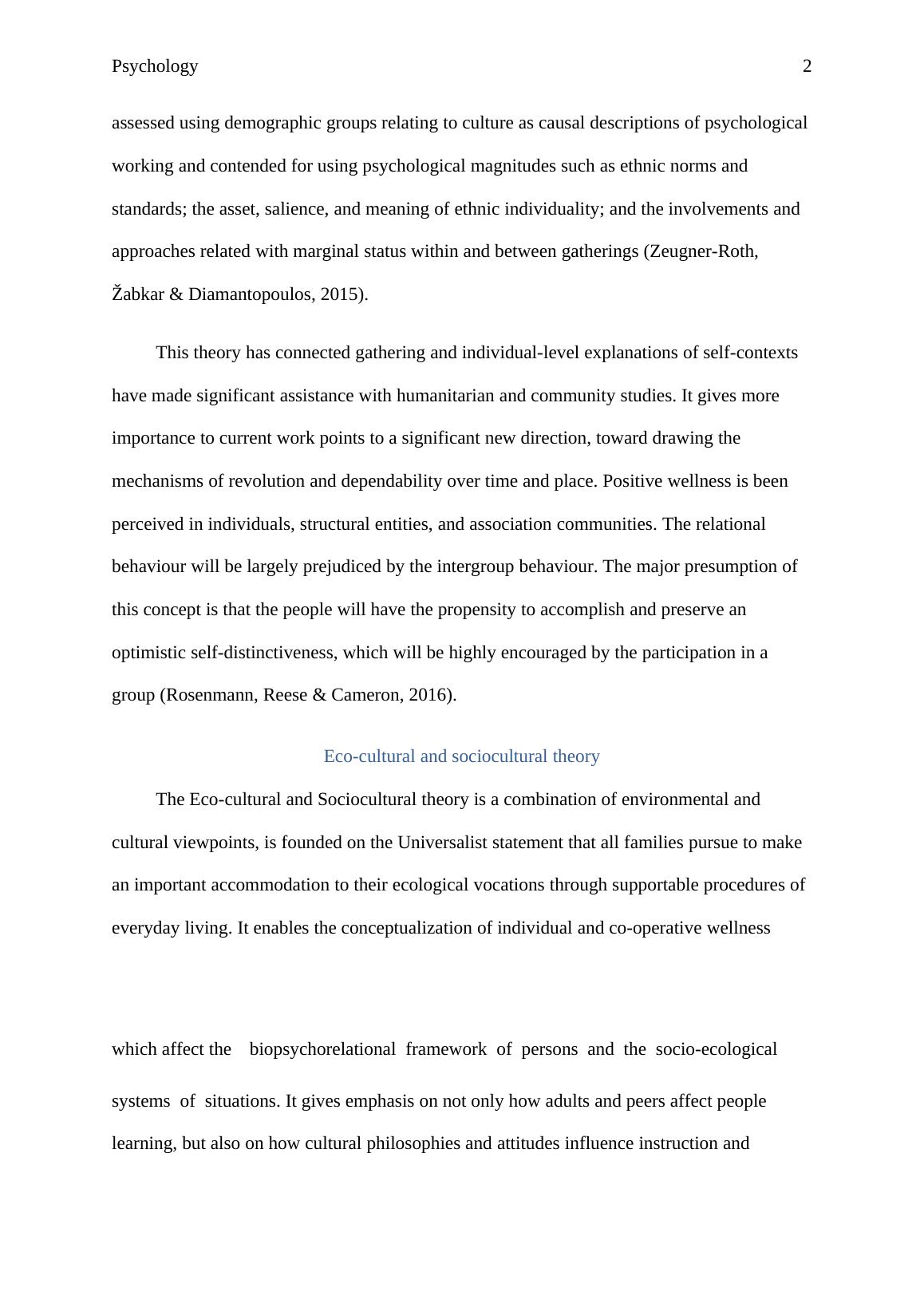Psychological Theories Explaining Behaviour in Humanitarian and Community Studies
Added on 2023-06-07
10 Pages2382 Words413 Views
Running Head: Psychology 0
Psychology
Psychology

Psychology 1
Q.1 How does the Psychological theory explain a particular behaviour in Humanitarian and
community studies?
Ans. Cross-cultural psychology is the systematic study of human behaviour and
psychological procedures, including both their inconsistency and invariance, under diverse
cultural situations (Shiraev & Levy, 2016). This chapter touches classic problems in
involving community-specific and cultural-universal objectives across two theories of cross-
culture and mental procedures: -
Social Identity theory
Eco-cultural and Sociocultural Theories
Social Identity theory
Social Identity Theory illustrates a particular behaviour in humanitarian and community
studies as associates of all societies involve in social classification and grouping. It is stated
that social distinctiveness is constructed in the framework of attitudes toward one's group,
and is associated with prejudice, intergroup disagreement, philosophy, and cultural
assimilation. The impact of social factors on a person's mind or behaviour, and to the
interconnection of behavioural and social issues; also, more widely, relating to the
interrelation of mind and society in human advancement. It demonstrated that people
inspiration to claim and direct their social personalities which depend on the challenging
needs for comprehensiveness and individuality, whereby individuals seek an optimum level
of uniqueness" in choosing a group. It examined social stress, the significance of identity
interruption theory and the stress impacts of role conflict and prestige inconsistency. Social
identity theory was established as an integrative concept, as it intended to connect cognitive
procedures and behavioural motivation (Bloom, Arikan & Courtemanche, 2015). Primarily,
its attention was on an intergroup dispute and intergroup associations more broadly. It is
Q.1 How does the Psychological theory explain a particular behaviour in Humanitarian and
community studies?
Ans. Cross-cultural psychology is the systematic study of human behaviour and
psychological procedures, including both their inconsistency and invariance, under diverse
cultural situations (Shiraev & Levy, 2016). This chapter touches classic problems in
involving community-specific and cultural-universal objectives across two theories of cross-
culture and mental procedures: -
Social Identity theory
Eco-cultural and Sociocultural Theories
Social Identity theory
Social Identity Theory illustrates a particular behaviour in humanitarian and community
studies as associates of all societies involve in social classification and grouping. It is stated
that social distinctiveness is constructed in the framework of attitudes toward one's group,
and is associated with prejudice, intergroup disagreement, philosophy, and cultural
assimilation. The impact of social factors on a person's mind or behaviour, and to the
interconnection of behavioural and social issues; also, more widely, relating to the
interrelation of mind and society in human advancement. It demonstrated that people
inspiration to claim and direct their social personalities which depend on the challenging
needs for comprehensiveness and individuality, whereby individuals seek an optimum level
of uniqueness" in choosing a group. It examined social stress, the significance of identity
interruption theory and the stress impacts of role conflict and prestige inconsistency. Social
identity theory was established as an integrative concept, as it intended to connect cognitive
procedures and behavioural motivation (Bloom, Arikan & Courtemanche, 2015). Primarily,
its attention was on an intergroup dispute and intergroup associations more broadly. It is

Psychology 2
assessed using demographic groups relating to culture as causal descriptions of psychological
working and contended for using psychological magnitudes such as ethnic norms and
standards; the asset, salience, and meaning of ethnic individuality; and the involvements and
approaches related with marginal status within and between gatherings (Zeugner-Roth,
Žabkar & Diamantopoulos, 2015).
This theory has connected gathering and individual-level explanations of self-contexts
have made significant assistance with humanitarian and community studies. It gives more
importance to current work points to a significant new direction, toward drawing the
mechanisms of revolution and dependability over time and place. Positive wellness is been
perceived in individuals, structural entities, and association communities. The relational
behaviour will be largely prejudiced by the intergroup behaviour. The major presumption of
this concept is that the people will have the propensity to accomplish and preserve an
optimistic self-distinctiveness, which will be highly encouraged by the participation in a
group (Rosenmann, Reese & Cameron, 2016).
Eco-cultural and sociocultural theory
The Eco-cultural and Sociocultural theory is a combination of environmental and
cultural viewpoints, is founded on the Universalist statement that all families pursue to make
an important accommodation to their ecological vocations through supportable procedures of
everyday living. It enables the conceptualization of individual and co-operative wellness
which affect the biopsychorelational framework of persons and the socio-ecological
systems of situations. It gives emphasis on not only how adults and peers affect people
learning, but also on how cultural philosophies and attitudes influence instruction and
assessed using demographic groups relating to culture as causal descriptions of psychological
working and contended for using psychological magnitudes such as ethnic norms and
standards; the asset, salience, and meaning of ethnic individuality; and the involvements and
approaches related with marginal status within and between gatherings (Zeugner-Roth,
Žabkar & Diamantopoulos, 2015).
This theory has connected gathering and individual-level explanations of self-contexts
have made significant assistance with humanitarian and community studies. It gives more
importance to current work points to a significant new direction, toward drawing the
mechanisms of revolution and dependability over time and place. Positive wellness is been
perceived in individuals, structural entities, and association communities. The relational
behaviour will be largely prejudiced by the intergroup behaviour. The major presumption of
this concept is that the people will have the propensity to accomplish and preserve an
optimistic self-distinctiveness, which will be highly encouraged by the participation in a
group (Rosenmann, Reese & Cameron, 2016).
Eco-cultural and sociocultural theory
The Eco-cultural and Sociocultural theory is a combination of environmental and
cultural viewpoints, is founded on the Universalist statement that all families pursue to make
an important accommodation to their ecological vocations through supportable procedures of
everyday living. It enables the conceptualization of individual and co-operative wellness
which affect the biopsychorelational framework of persons and the socio-ecological
systems of situations. It gives emphasis on not only how adults and peers affect people
learning, but also on how cultural philosophies and attitudes influence instruction and

End of preview
Want to access all the pages? Upload your documents or become a member.
Related Documents
Depression Among International Students: Cultural Adjustment and Its Impactlg...
|6
|1308
|439
Reflection on Social Work Theories.lg...
|5
|663
|52
Social Psychology in Organisationlg...
|9
|2463
|81
Social Psychology - Assignment PDFlg...
|5
|846
|75
Institution Social Psychology Prejudicelg...
|3
|752
|32
Reflection Report on Cultural Diversity: A Personal Perspectivelg...
|7
|1619
|360